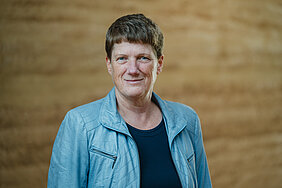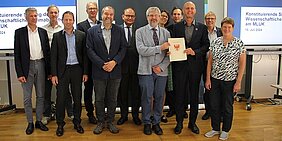On 15 July 2024, Prof. Annette Prochnow was appointed to the Brandenburg Climate Council together with 11 other scientists. The new committee provides scientific support for the implementation and monitoring of the Brandenburg Climate Plan.
"The implementation of the climate plan adopted in March is crucial on the path to Brandenburg's climate neutrality by 2045," said Brandenburg's Climate Protection Minister Axel Vogel during the inaugural meeting. “The Scientific Climate Council will play a central role in monitoring the achievement of the climate targets. We have succeeded in attracting high-calibre scientists to the advisory board. They will monitor climate policy in Brandenburg and provide scientific support with proposals for further development. This has never happened before in this form in Brandenburg and is a great benefit for our state.”
Annette Prochnow is Head of the Department Technology Assessment at Leibniz Institute for Agricultural Engineering and Bioeconomy in Potsdam and one of those appointed: “For climate protection to succeed, we need solutions that are ecologically and economically viable and practicable. Let's look at emissions from agriculture, for example. Some of them are unavoidable. For a functioning circular economy, we need animal husbandry, for example, whose emissions cannot be reduced to zero. We can compensate this by rewetting drained moorland. This is because wet moors not only emit significantly fewer climate-damaging gases; they can also remove carbon dioxide from the atmosphere in the long term. But what does rewetting mean for farms that cultivate such areas? What environmental effects do we achieve? And how can we make it economically efficient and socially just?”
Together with her colleagues at ATB, Annette Prochnow develops new techniques and processes for the management of rewetted sites, opens up new value chains and evaluates them. She is now looking forward to supporting Brandenburg on its path to climate neutrality through her work on the Climate Council.
The Climate Council is an instrument of the climate plan adopted by the state of Brandenburg in March 2024. It defines the fields of action for climate protection and specifies how measures are to be evaluated. The newly created scientific Climate Council intends to independently monitor interim results and measures and show political decision-makers the paths, options, risks and potential.
The members are initially appointed for three years until 31 July 2027 by the Ministry of Agriculture, Environment and Climate Protection (MLUK). The Potsdam Institute for Climate Impact Research will chair the Council. By the end of the year, an office will be set up at PIK with two research assistants to support the Chair and the Council. Annette Prochnow will contribute her expertise on the circular economy and bioeconomy as well as peatland protection.


